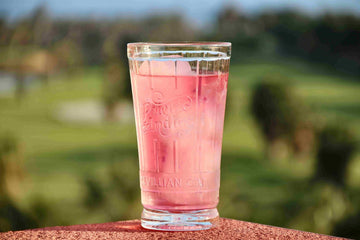What is London Dry Gin & How Does it Differ from Traditional Gin?
by William Rusling on Oct 31, 2023
London Dry Gin is a type of gin known for its crisp, clean flavour with a strong juniper presence. Unlike traditional gin, it must be distilled to a completely neutral spirit before botanicals are added, and no artificial flavours or colours can be added after distillation. This results in a more refined and pure taste.
What is London Dry Gin?
London Dry Gin is a particular style of gin that is known for its crisp, clean flavour profile. Despite what the name might imply, London Dry Gin does not have to be made in London. Instead, the term 'London Dry' refers to the specific method of production used and the resulting flavour profile.
Origins of London Dry Gin
London Dry Gin saw its inception during the surge in gin popularity in 19th-century England. A more efficient distillation method, known as continuous or column distillation, was developed during this period, which led to the creation of a more refined alcohol. This innovation resulted in a gin style that was drier and sharper compared to its contemporaries, which were typically sweet. This new flavour quickly gained popularity and was named 'London Dry Gin' to honour its birthplace and its unique dry, unsweetened taste.
How is London Dry Gin Made?
The distillation process of London Dry Gin involves redistilling a base spirit made from fermented grain mash with selected botanicals. The juniper berry is a must for any London Dry Gin, but other botanicals, such as coriander seeds, angelica root, and citrus peels, may also be included.
Unmasking the Taste of London Dry Gin
London Dry Gin carries a vibrant, crisp, and clear flavour. The juniper is the star in the gin show, and it shines even brighter in London Dry, due to its production process. Beyond the juniper, the botanical blend can craft a wide range of flavours. Citrus notes, from orange or lemon peels, are common, as is a touch of spice, contributed by botanicals like coriander seeds or angelica root.
What Sets London Dry Gin Apart?
The production method, unsweetened profile, and stringent regulations differentiate London Dry Gin from other gins. No additives, such as artificial flavours, colours, or sweeteners, are allowed after distillation. This gives London Dry Gin its pure, undiluted taste.
London Dry Gin vs Traditional Gin: The Distinct Differences
While traditional gin and London Dry Gin both spring from juniper berries, differences in production methods and regulations create distinct characteristics.
In traditional gin, botanicals are infused into the spirit, often sweetened post-distillation. In contrast, London Dry Gin is distilled with botanicals, and no sweetener is added after distillation. This results in a 'dry' finish and a more intense flavour profile in London Dry Gin.
The Special Designation of 'London' in London Dry Gin
Unlike Champagne or Scotch Whisky, 'London' in London Dry Gin doesn't imply geographical designation. Rather, it signifies the unique style of gin that originated in London during the 19th-century gin boom.
Nevertheless, 'London Dry Gin' is safeguarded under European Spirit Drink regulations. This ensures that to use the name 'London Dry Gin', adherence to specific production methods is mandatory, regardless of the gin's geographical origin. This safeguards the quality and defining characteristics of London Dry Gin, wherever it's made.
The Art of Distilling London Dry Gin
Mastering the Craft of Distilling London Dry Gin
The distillation process of London Dry Gin isn't just a series of procedures but an art form that requires the perfect balance of precision, knowledge, and finesse. The blend of botanicals each producer selects is a tightly guarded secret, playing a critical role in creating a distinctive, harmonious flavour profile.
Navigating the Distillation Process
The distillation process is key to the distinct character of London Dry Gin. The journey begins with a neutral spirit, usually derived from grain. This spirit undergoes a second distillation with the selected botanicals.
As the spirit heats in the still, it turns into vapour, which then passes through a chamber filled with the chosen botanicals. The hot vapour extracts the flavours from the botanicals before being condensed back into a liquid. This careful process results in a gin imbued deeply with the flavours of the botanicals.
Crucially, all flavourings must be introduced during this distillation stage in the London Dry process. No flavours can be added post-distillation, ensuring the resulting gin is an unadulterated expression of the botanicals used.
After distillation, the gin is diluted with water to achieve the desired strength. It's then ready to be bottled, its clear, clean taste and complex flavours a testament to the careful, controlled process that produced it. This method, upholding the integrity of the London Dry tradition, brings to life a gin that is simultaneously vibrant, intricate, and pure.
The Significance of Botanicals in London Dry Gin
Botanicals are at the heart of defining the taste and character of London Dry Gin. The juniper berry, with its pine-like, slightly fruity, and resinous flavour, takes centre stage. But the supporting cast of botanicals adds their unique notes to the blend, shaping a complex, multifaceted flavour profile.
Common players in the botanical mix include coriander seeds, angelica root, citrus peels, and orris root. Coriander seeds lend a spicy, citrusy accent, angelica root contributes a woody, earthy taste, and citrus peels add a bright, zesty touch. Orris root, a less obvious character, plays an essential role in binding the flavours together, creating a more harmonious final product.
Conclusion
London Dry Gin is a vibrant and distinguished variant of the gin category. Its defining characteristics, such as the required use of natural botanicals, absence of artificial flavourings, and the restriction on sugar content, set it apart from other traditional types of gin. While other gins may introduce flavours after the distillation process, London Dry Gin's complex taste profile is entirely shaped during distillation. You can learn more about how gin is distilled, on Filey Distillery’s tour.



